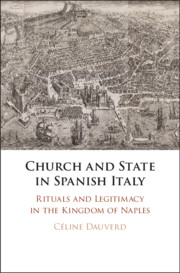Book contents
- Church and State in Spanish Italy
- Church and State in Spanish Italy
- Copyright page
- Contents
- Figures
- Table
- Acknowledgments
- Introduction
- 1 The Spaniards in Charitable Institutions
- 2 Viceroys, Jews, and Conversos
- 3 The Miracle of San Gennaro
- 4 Easter Processions
- 5 Corpus Domini Celebration
- 6 San Giovanni a Mare
- Conclusion
- Bibliography
- Index
Conclusion
Published online by Cambridge University Press: 09 March 2020
- Church and State in Spanish Italy
- Church and State in Spanish Italy
- Copyright page
- Contents
- Figures
- Table
- Acknowledgments
- Introduction
- 1 The Spaniards in Charitable Institutions
- 2 Viceroys, Jews, and Conversos
- 3 The Miracle of San Gennaro
- 4 Easter Processions
- 5 Corpus Domini Celebration
- 6 San Giovanni a Mare
- Conclusion
- Bibliography
- Index
Summary
Resolving to bequeath to his son Philip the greatest empire the world had known, Charles V wrote a memorandum on “the times of peace and the times of war” by touching upon the practice of good government. Charles penned “for a prince to govern his people and to be loved by them in times of peace, he must follow the three components and qualities of good government. Apart from the cult of religion, he must display faith, continence, and justice. Faith provides integrity and makes him a man of his word … continence attracts respect … and justice teaches him to reward the good and punish the bad.” Charles pursued “beware that festivities and spectacles alone will not keep people aligned and content, which occurs only when people are well treated.”1 Charles and Philip endeavored to exemplify the princes who applied good government. And the viceroys they appointed lived according to this precept. An important component of good government related to festivities, which were not to replace good government but to illustrate it. Moreover, of utmost significance to Charles was religion as a guiding principle of princes. Good government and religion were therefore the two political anchors of premodern rulers, whether princes, kings, emperors, or viceroys.
- Type
- Chapter
- Information
- Church and State in Spanish ItalyRituals and Legitimacy in the Kingdom of Naples, pp. 247 - 260Publisher: Cambridge University PressPrint publication year: 2020



